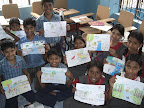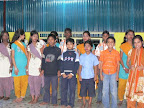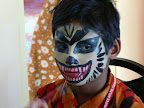Before I left my home country I felt particiularly more tensed about my forthcoming holiday then on previous occasions.
The difference was that now I had engaged myself to do volunteer work.
An area where I have almost no experience in.

After some communication with TDP I expressed my preference to do more practical things because teaching is not my thing, I thought.
Once I was in Gawair, Dhaka, I came to know that at present the practical things like building toilets or planting trees weren't the most urgent things on the list.
We went on a survey to look in the slum if toilets were needed.
I learned a lot about toilet culture in Bangladesh.
Like if you build a toilet you also have to hire someone te keep it clean. People will not clean it themself, they also rely on the annual floodings to wash away excess excrements.
With all repect but people who daily have to worry about their primary needs don't have a fancy toilet on top of their want list.
There I was, still with a jetlag in my body and the knowledge that I was't going to do any practical things.
What am I doing here I doubted! Teaching wasn't an appealing alternative for me.
I agreed to give it a go.
The first classes I was together with other teachers which helped me a lot.
Mahmuda gave me some Bangla vocabulary with which I could draw attention when needed.

Because of shortage of teachers I was soon giving classes on my own.
English, maths, science and computer class were on my list.
I became classteacher of standard II-E. This involves that you register who is present, which children feel sick and which children have lunch.
As an English medium school I at least expect english textbook for the subject English but for standard II there wasn't any available.
Teach them anything I was answered but I honestly believe that as a school you should try to follow a curriculum.
Once you get in a routine of having the same classes over and again you know what to expect from the students and they know what to expect from you.
The first days I put a lot of time in getting some discipline in the students. They were talking, running and doing as they pleased. This was disturbing me and others students were easily distracted.
I remember one of my first classes alone I went to a girl in the back with her head on the table.
Like a woodpecker I used my board marker on her table to draw attention but she started crying, I had to get another teacher to explain and comfort her.
It was only later when I realised what an enormous creature I must have been these first days.
Whitin one class you have a big variety between students. Some very clever other lazy or just not smart enough.

It was also important to involve every student. The easiest thing, is to go with the smartest and fastest students.
It was new for most students because I didn't let the good ones always read or answer.
I also explained why, because I could see their disappointments.
To the other I explained why they had to answer and that if it was wrong I would help them.
Showing them that they were here to learn not for knowing everything already.
I explained in simple everyday things why maths is important e.g. going to the baza, possible cheating by others,...
The better students helped them orally in Bangla on the white board doing devisions.
So after a coupple of weeks some of the weaker students started to blossom and take initiative to show themself instead of hiding in the back.
There is still work in getting their level of knowledge to the same level as the better students but extra classes woud be very helpfull.
These children are very spontaneous. The more I worked with them the more I got mesmerized by their natural way of being.
They never seem preoccupied and they instantly forget when you reprimand them.

They don't doubt in their acting towards each other or you as a foreigner.
One day in class 2-E I raised my voice to Masadul that he had to stop talking or that he otherwise could do his talking in front of the class.
OK, but may I do it in Bangla, was his answer.
The next 10 minutes he was talking with a big smile on his face. The others were listening with staring eyes and open mouths, sometimes a massive laughter escaped.
In class VI there was Al-Amin who sang with a lovely voice in front of the class and Sumon from class V he enjoyed singing his whole repertoire while we had to wait for our lunch donated by Emirates.
But in one class I encoutered a lot of struggle. I had to teach English but their level of English was really miserable.
Their behaviour was like lacking any respect.
With a bideshi (foreigner) as teacher it is partytime they presumed!
I was troubled and thinking why the behaviour was so different from other classes.
I was told that these are children from criminals and that's why, they don't have any example at home. That's no excuse!
Maybe it was to hide their lack of knowledge they behaved like this.
It costed a lot of effort to get some authority. Sometimes I had to force myself not to laugh with their brilliant imitation of myself. I knew that I gave in I had to start all over again.
 Once they started to try to cooperate they all wanted to be as good as each other.
Once they started to try to cooperate they all wanted to be as good as each other.Altough it was a difficult class till the last day I have fond memories of them. So young, Zahirul, Ranju, Yasin and Rasel and already such a macho behaviour, even the girls had a lot af character.
Sometimes a workshop was organised for to the teachers. The aim was to improve their spoken English.
I don't know whether they liked the workshop or that it was a better alternative to giving extra curriculum activities. Anyway the time spent at this workshop was worthwhile and at times very animated. A pity that only took word those who were already good in it.
There is also a lot of absence by students. Most of them keep it by 1 day a week.
One day we went on studentcounseling, talking to parents of students who are absent for a long period.
For me it was quite an experience. It revealed everything that the teachers said about student absence was somehow true.
Major factor is economical reason. Some of the parents suggest whitout any shame that house rent paid by TDP would solve this problem.
So some children go out working. One girl prefered this to going to school.
Then you have disinterested students and/or parents, they don't really care about long term effects.
The environment is not very stimulating for children to go to school or even to study at home.

Other have really lame excuses. E.g. I have a sore eye. There is free healthcare for you I responded.
I can imagine that this counseling becomes demotivating but it should be a standardprocedure very soon after prolonged absence e.g. 1 or 2 weeks absence.
A special class was the adult (ranging from 20 to 53 years) English class.
The older students were really keen on learning English. As an excercise they had to tell their favourite memory.
Some unbelievable stories were told with a lot of nerves in this simple Bengali English.
One person told about his childhood adventure on a train.
As a child he always dreamt about a train journey.
One day he was about 9 years old he had the opportunity. What went wrong I don't know exactly but he always mist his station and as a result he was on this local train for 3 days whitout any food till somebody helped him.
From this people I learned that they are really concerned about the future of their children.
They wondered if the teaching was OK, if there are similar projects as TDP in the world.
They asked if TDP was able to provide the A or O level certificate. Explaining that this is a long term process which is the responsibility of the school, the child and also the parents I further accentuated that at present TDP is giving your children a better childhood.
You just have to look at these happy children with their eternal smiles.
As conclusion I want to express my gratitude to Maria and everybody who is involved in making this project running whether in Dubai, Bangladesh or any other place.
Ferre






No comments:
Post a Comment